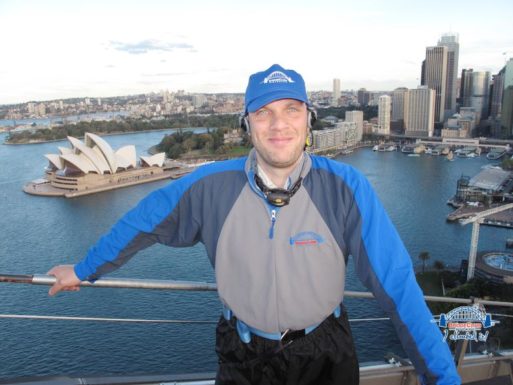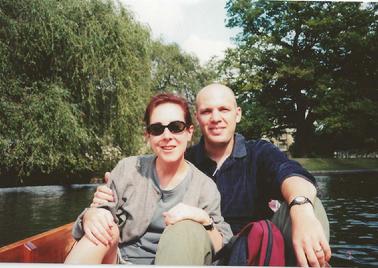
Dr. Thaddeus Pope in Sydney, Australia
Dr. Thaddeus Pope is a law professor and bioethicist whose work focuses on end-of-life options and patient rights. He teaches at Mitchell Hamline University’s Health Law Institute and received a Fulbright Scholar Award in 2020 to research Canadian and American policies on end of life, medical futility and brain death. He is the author of the Medical Futility Blog as well as two books: “The Right to Die: The Law of End-of-Life Decisionmaking” and “Voluntarily Stopping Eating and Drinking: A Compassionate, Widely Available Option for Hastening Death.”
While Dr. Pope’s expertise encompasses a wide range of legal and medical concerns, a common thread throughout his work is the issue of patient liberty. The rights of a patient to choose their treatment and determine their own fate is at the center of many bioethical debates, and when it comes to the end of life, these stakes are particularly high. Whether through teaching, writing, research or consulting on medical policymaking, Dr. Pope’s work focuses on advocating for patients’ self-determination through law. This includes medical aid in dying (MAID) as well as the lesser-known option of voluntarily stopping eating and drinking (VSED).
Dr. Pope was kind enough to meet with me over Zoom after one of his evening classes. Rather than being tired after a day of teaching, he seemed energized and happy to talk about the complicated issues of healthcare, ethics and law — a passion that explains his frequent appearances as a media expert on end-of-life topics.
Editor’s note: This interview has been edited for length and clarity.
Thank you for taking the time to speak with me today. To start off with, can you explain the difference between medical aid in dying and voluntarily stopping eating and drinking? Why might someone choose one or the other?
The first big distinction is that medical aid in dying is only legal in 11 states. With MAID, a physician gives you a lethal prescription. If your state hasn’t legalized MAID, that would be considered a felony.
With voluntarily stopping eating and drinking, however, it doesn’t matter whether your state has specified that it’s legal, because it’s just withholding food and water. If a patient doesn’t want to eat or drink, they don’t have to. They’re not asking anyone to help them cause their death. For that reason, VSED is available everywhere.
Another distinction is that MAID is much quicker. Once you take the lethal prescription, you’ll fall asleep very quickly and be dead in an hour or two. VSED takes 10–14 days, so it’s a much slower process. Most people prefer MAID for that reason, if it’s an option in their state. Not everybody, however — some people have a problem with it morally, or they may actually want to have a slower process where their loved ones can have more time to say goodbye as they gradually fade away.
There have been some studies, in Oregon for example, where people had both choices, and a significant portion of people chose VSED. The same thing has been shown in the Netherlands – almost half as many people use VSED as use MAID there, even though MAID is widely available. About 2% of all deaths in the Netherlands are from VSED.
So overall, most people prefer MAID, but a significant fraction do prefer VSED. Also, VSED is often the only choice available, so while many people don’t think it’s the best choice, it may be their only choice.

Dr. Pope with wife Linda
What are some of the concerns and fears around MAID and VSED, and how do you address them?
The number one problem is that we lack clinical practice guidelines. With VSED, you don’t need to have a clinician involved. With MAID, you absolutely do. The statutes say you need one, two or three physicians to deem you eligible. But VSED just means you stop eating and drinking, which you can do in your own house.
However, with VSED, you are going to have undesirable symptoms from dehydration. In that respect, clinician supervision is very important. The problem is we lack guidelines for how clinicians should support and counsel the patient. A lot of places are hesitant because they’re not sure how to support a VSED patient. Some hospices have experience with it, but some don’t. It would be good if the National Hospice and Palliative Care Organization or another national palliative organization would issue a guidance document about VSED support. There are articles in JAMA and other journals that do this, but nothing from a major national healthcare society. I think that’s a big obstacle.
The other thing is that people just don’t know about VSED. There are a lot of myths and misconceptions about it, from the patient’s side and from the clinician’s side. It gets unjustly denigrated in the public spotlight. Sometimes that’s for political reasons: In order to enact a MAID statute, proponents will point out that the only alternative is VSED, and they’ll claim that this option is terrible and inhumane. However, all the evidence shows that VSED is usually peaceful and comfortable.
What end-of-life options are available for people with dementia?
Dementia is not a qualifying condition for MAID on its own. If you had cancer and early-stage dementia, you could qualify based on the cancer. But if you’re within six months of death from dementia, you don’t have the decision-making capabilities that are required by MAID laws.
On the one hand, MAID statutes provide that kind of clarity around eligibility, but that also means there are a lot of constraints around who’s eligible. That’s not the case with VSED. Say you have relatively early-stage dementia, and you’re afraid of living with late-stage dementia — you’re afraid of not being able to recognize your family or go to the bathroom on your own; you’re concerned about things you find scary and intolerable. In that case, you could choose VSED right now. You don’t need to be terminally ill to use VSED, like you do with MAID.
Secondly — and this is the most controversial part of VSED — you could complete an advance directive telling your caregivers to stop feeding you and giving you water under specific conditions. That’s a key advantage of VSED over MAID.
That’s only in some states, however. An advance directive for VSED is not legal everywhere. In Wisconsin, for example, state law says that advance directives are only for health care decisions, and it does not consider food and fluid by mouth to be health care. But in some states, you can use advance directives for a variety of things — what kind of funeral you’ll have, what type of bedsheets you want, etc.

Dr. Pope with son Finn
If a person chooses VSED or MAID, what will the cause of death be on their death certificate? Would using those options affect life insurance payouts?
About half of the states that have legalized MAID specify that the underlying illness should be listed as the cause of death. There’s also no rule that you have to put VSED down as the cause of death if you are using that option.
Generally, the rules for death certificate completion are such that you would put down the underlying cause of death, not the immediate cause of death. With MAID, obviously the immediate cause of death is the lethal drugs, and with VSED it would be dehydration. But nobody writes VSED as the cause of death.
As for life insurance, even if the death is put down as a suicide on the death certificate — and generally, this doesn’t happen — suicide exclusion clauses on life insurance policies are only for two years. If you purchased the life insurance policy more than two years ago, even if your death were considered a suicide, it wouldn’t affect the payout.
MAID also has the benefit of a statute specifying that it does not constitute suicide. If MAID is legal in a state, that means state legislators have decided that it is not suicide. That’s not true for VSED because there aren’t specific laws permitting VSED, but the general understanding is that it’s not.
Can caregivers in long-term care facilities be liable in any way if a patient chooses VSED?
The general understanding is that’s a decision the patient can make for themselves, and it should be honored. The Society for Post-Acute and Long-Term Care Medicine issued a statement in 2019 saying VSED is absolutely the patient’s right. However, they opposed advance directives for VSED. Their stance was that we need to focus on the person today, not the person from five or eight or ten years ago who wrote the directive.
To be fair, though, long-term care is tricky. People that work in these facilities – CNAs, for instance – aren’t always comfortable with VSED. There’s a gap between the law and the bedside reality. You may have the right to VSED, but will it actually be honored? Of course, that’s not unique – you have rights to lots of things, but there’s a difference between theory and reality. That’s why I said guidance around VSED would help – guidance and training. Of course, the turnover rate in long-term care is ridiculously high, so training is going to be expensive because you’ll have to repeat it.
Those are practical implementation concerns, and they’re big ones. Is it ethical, is it legal, is it a recognized right? Yes. Where do I get it? That’s the harder part. It’s easier in some places than others.
For someone considering MAID or VSED, where would you recommend they begin? Can you recommend any resources?
We [TE Quill, PT Menzel, JK Schwarz and I] just published a book on this. It’s probably the most comprehensive treatment of VSED from clinical, ethical, legal and institutional perspectives. In addition to our book, I would recommend a website called VSED Resources Northwest. It’s consumer-facing, written for a wide audience. You can also consult a professional, and it doesn’t have to be a doctor – you could talk to an end-of-life doula, for instance.
What about for someone looking for information on the legality of end-of-life options?
The problem is, VSED has been neglected in this regard – it hasn’t gotten the same attention as MAID, which is before the legislature every year. So from a legal perspective, even if you get an estate planning attorney or an elder law attorney, they might not be able to answer questions about VSED.
Frankly, if you were to consult a lawyer and they were to research these options for you, they would probably start by reading our materials. For instance, if you had a lawyer in South Dakota, they might read something I wrote and then apply their own knowledge of South Dakota law. That might include abuse and neglect laws (because you are literally letting them dehydrate to death), assisted suicide laws and life insurance laws. I’ve researched these myself, and in almost every jurisdiction VSED doesn’t violate these laws, but it’s good to check.
There is also an international organization called the Final Exit Network, which helps people attain the end-of-life path that they want. They have something called a Supplemental Advance Directive for Dementia Care. If you have a SADD, and it’s not being honored by your nursing home or long-term care facility, you can call them and they’ll give you free legal help.
In general, however, unless there are specific concerns, you don’t necessarily need legal guidance to pursue VSED or MAID. Generally, the whole point of a lot of these options is that you shouldn’t need to talk to a lawyer.

 End-of-Life Options and the Law: Understanding VSED vs MAID
End-of-Life Options and the Law: Understanding VSED vs MAID


 “As Tears Go By” by Marianne Faithfull
“As Tears Go By” by Marianne Faithfull

 Funeral Favors Offer Visitors a Tangible Memento
Funeral Favors Offer Visitors a Tangible Memento















